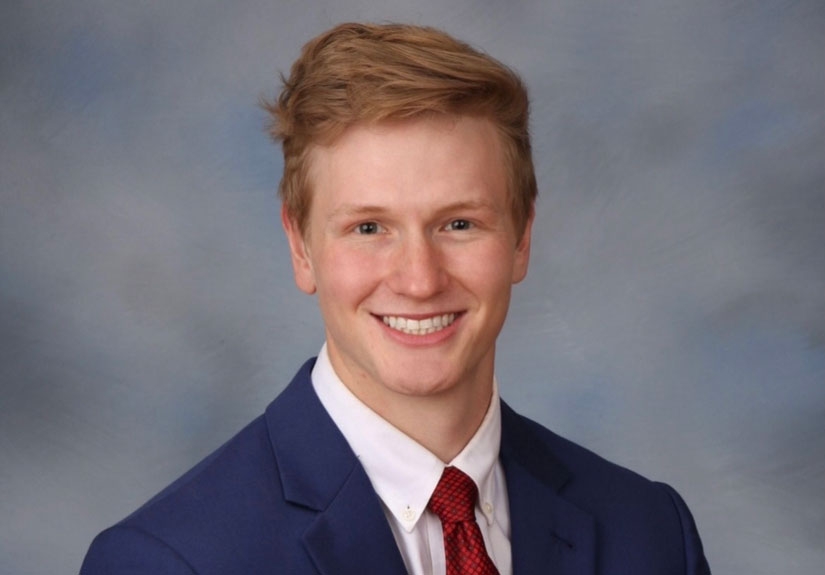Public Health Buckeyes: John Gardner
‘One Health’ sparks BSPH student’s path in public health

Each month, the College of Public Health shines a spotlight on one of its students. This month, meet John Gardner, a fourth-year BSPH student in environmental public health. An active leader in Greek life and the One Health Club, Gardner plans to take two gap years gaining experience working as a health care technician before attending medical school.
Question and Answer
What drew you toward public health?
I’ve always been a STEM-minded individual, and my passion for medicine and environmental science drew me toward public health at Ohio State. Before college, I was constantly in and out of doctors’ offices due to knee injuries resulting from high school football. The excellent care I received during these times inspired me to make a similar difference in a medical setting. My interest in environmental science led me to investigate the all-encompassing One Health approach, which emphasizes the interconnectedness of environmental, human and animal health. This concept struck me as crucial to understanding public health and ultimately caused me to seek out environmental public health.
Can you tell us about your senior capstone project with Mount Carmel?
For my BSPH capstone experience, I’ve been working as a multi-skilled health care technician for Mount Carmel. Under the direction of nurses, I primarily spend my time providing hands-on care to patients. This includes phlebotomy, obtaining vitals and even responding in emergency scenarios to resuscitate unconscious patients. I work on a different floor of a different hospital each shift, and each day presents me with new patients and new responsibilities.
As a pre-med public health student, this role has enabled me to gain training and experience in a clinical setting and to get a clearer perspective of how public health issues like COVID-19 can affect hospitals and the people who receive care in them.
Are you involved in any other academic, professional or student activities?
I currently serve as president and social chairman of Theta Chi Fraternity and the philanthropy chairman of the One Health Club. I’ve also had internships in public policy and biomedical engineering research at the Ohio State House and Cleveland Clinic, respectively.
How have these experiences shaped your education?
Each of these experiences has positively shaped my education. Theta Chi has provided me with a network of people that consistently help with my studies. Being president of the fraternity has been highly beneficial and maturing, especially the experience of managing our executive board for an organization of 150 people during the COVID-19 pandemic. The fraternity also offered philanthropy opportunities for our organization’s charities: the United Service Organization and the National Alliance on Mental Illness.
The One Health Club has been an entirely different experience. I had the pleasure of helping build the club after being contacted by the founding co-presidents. I believe the One Health approach this is the best way to attack public health-related issues, and it’s been great attending club meetings and hearing from researchers and representatives from numerous public health organizations.
What’s something you wish people knew more about public health?
Although my personal goal is to enter medical school, I don’t think that everyone understands the number of opportunities there are in public health. Between careers in epidemiology, education, public policy, the legal field and many others, there truly are no limits with a degree in public health.
What advice would you give to students considering pursuing public health?
Don’t be afraid to explore your options. Public health is a wide field, so if you go in planning to be a doctor, epidemiologist or lawyer, you don’t need to feel pressured to stay in this role. My public health degree has helped me feel prepared for whatever may lie on the path ahead.
What do you hope for the future of public health?
I hope that trust in science may be universally restored. Issues of public health, such as the pandemic and climate change, are often construed as political issues and miss the scientific arguments being made. I hope that we, as a society, can come together and agree upon logical action for world crises based on scientific reason, not political gain.
About The Ohio State University College of Public Health
The Ohio State University College of Public Health is a leader in educating students, creating new knowledge through research, and improving the livelihoods and well-being of people in Ohio and beyond. The College's divisions include biostatistics, environmental health sciences, epidemiology, health behavior and health promotion, and health services management and policy. It is ranked 22nd among all colleges and programs of public health in the nation, and first in Ohio, by U.S. News and World Report. Its specialty programs are also considered among the best in the country. The MHA program is ranked 5th and the health policy and management specialty is ranked 21st.